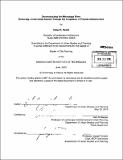| dc.contributor.advisor | Alan M. Berger. | en_US |
| dc.contributor.author | Heard, Haley R. (Haley Ruth) | en_US |
| dc.contributor.other | Massachusetts Institute of Technology. Dept. of Urban Studies and Planning. | en_US |
| dc.coverage.spatial | n-usm-- | en_US |
| dc.date.accessioned | 2010-10-29T18:27:10Z | |
| dc.date.available | 2010-10-29T18:27:10Z | |
| dc.date.copyright | 2010 | en_US |
| dc.date.issued | 2010 | en_US |
| dc.identifier.uri | http://hdl.handle.net/1721.1/59736 | |
| dc.description | Thesis (M.C.P.)--Massachusetts Institute of Technology, Dept. of Urban Studies and Planning, 2010. | en_US |
| dc.description | Vita. Cataloged from PDF version of thesis. | en_US |
| dc.description | Includes bibliographical references (p. 100-102). | en_US |
| dc.description.abstract | The most prevalent social and economic issues plaguing cities are symptomatic of much bigger underlying environmental problems. Cities are governed by legislation set within artificial political boundaries, however ecology systems surpass and are not restricted by these boundaries. The decisions urban designers and planners make on behalf of a city influences the natural environment, which in turn can affect other cities negatively. This thesis addresses the current disconnect between the way cities are planned, their artificial boundaries, and the larger, underlying ecological systems. The purpose of this research is to create new methods of design and planning from ecological scale thinking. This thesis uses the Mississippi River as a case to illustrate how ecological scale thinking can reframe present urban design and planning paradigm. The research aims to answer the following questions: What are the principal causes of the Mississippi River's ecological degradation, and what measures can be taken to restore the River's quality? By regionalizing the organization of political jurisdictions, this will allow urban designers and planners to account for externalities and rebuild damaged ecological systems at the geographical scale. Over the past century, man-made interventions have transformed the Mississippi River, altering it from its natural form and processes. These augmentations have been the result of planning decisions, which ignore the larger ecological system of the River. This thesis demonstrates that the existing political juggernaut consists of many actors only considering problems within their own jurisdiction, and therefore make decisions in a vacuum. Instead of making a complete overhaul of the man-made system, this thesis proposes solutions utilizing the existing infrastructure and the waste it produces. It concludes by proposing a new management model: a Sediment Network that redistributes the waste sediment throughout the Mississippi River Basin in the form of new commodities. The Sediment Network illustrates at both the local scale and continental scale, how cities can utilize the sediment as a medium for urban revitalization, restore the River's health, and finally become an instrument for redistributing political power in order to achieve a more holistic form of planning. | en_US |
| dc.description.statementofresponsibility | by Haley R. Heard. | en_US |
| dc.format.extent | 104 p. | en_US |
| dc.language.iso | eng | en_US |
| dc.publisher | Massachusetts Institute of Technology | en_US |
| dc.rights | M.I.T. theses are protected by
copyright. They may be viewed from this source for any purpose, but
reproduction or distribution in any format is prohibited without written
permission. See provided URL for inquiries about permission. | en_US |
| dc.rights.uri | http://dspace.mit.edu/handle/1721.1/7582 | en_US |
| dc.subject | Urban Studies and Planning. | en_US |
| dc.title | Deconstructing the Mississippi River : restoring a continental system through the integration of flexible infrastructure | en_US |
| dc.type | Thesis | en_US |
| dc.description.degree | M.C.P. | en_US |
| dc.contributor.department | Massachusetts Institute of Technology. Department of Urban Studies and Planning | |
| dc.identifier.oclc | 670239551 | en_US |
